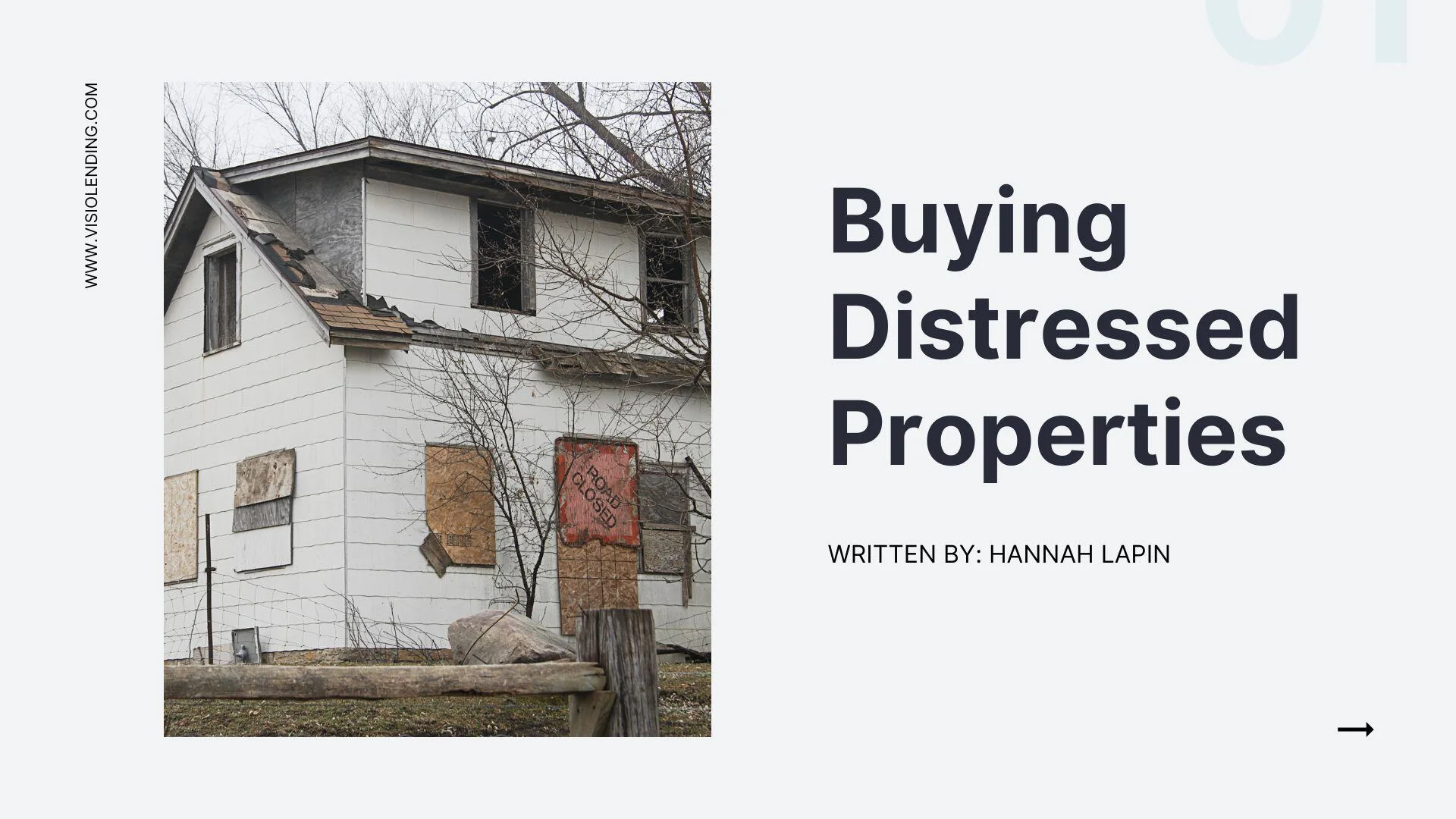If your financial goals include investing in real estate, you understand the importance of finding an affordable investment. The best deals in real estate are typically distressed properties, which may be a foreclosure sale, short sale, or bank-owned property.
Distressed properties can be excellent investment opportunities if you understand the pros and cons and have the necessary resources to find properties.
What is a distressed property?
A distressed property is a real estate asset that’s either pending foreclosure or already owned by the bank. Distressed properties are typically not maintained by the current property owner, either aesthetically or financially. A distressed property will usually need repairs or renovation or to be caught up on back-owed property taxes.
Types of Distressed Properties
You have a few options for choosing the right distressed property project. Distressed properties typically fall into one of the following types:
Foreclosures
A foreclosure property means the bank evicted the homeowner for failing to make their monthly mortgage payments. When a borrower defaults on their payments, the lender repossesses the property. In some cases, the lender may take the deed and assume ownership while allowing the current resident to live in the property as long as they continue making payments.
Some distressed properties may be in pre-foreclosure, which means the current homeowner has fallen behind on payments and may be at risk of foreclosure. Pre-foreclosures mean that while the homeowner has delinquent mortgage payments, they’re still within their legal right to catch up and avoid the foreclosure process.
Foreclosed properties belong to the lender. The lender may sell the distressed property at auction or through foreclosure.
REO Properties
A real estate-owned (REO) property is a bank-owned asset that doesn’t sell during an auction. Foreclosed homes may not sell for a number of reasons, including no one bidding enough to cover the foreclosure judgment.
Ongoing maintenance and upkeep of real estate assets can be expensive, meaning many banks are willing to sell their REO properties at a reduced price to offload the liability. When purchasing a real estate asset owned by a bank or government agency, you deal directly with the company rather than the seller.
Short Sales
Short sales are also considered distressed properties because they may be in poor condition, and the seller needs to sell quickly to avoid a foreclosed home. In a short sale, home buyers purchase the distressed property directly from the seller for a reduced price.
A short sale is a unique situation in which the homeowner has missed payments but has not yet gone into foreclosure. In most cases, the homeowner’s mortgage is higher than the home’s value, making selling in a traditional sale unrealistic.
If the lender approves, savvy investors may be able to purchase the property for a lower price. Short sale transactions allow real estate investors to acquire property for a good deal while helping the seller avoid foreclosure.
How to Find Distressed Properties
Buying distressed properties can be a profitable investment. However, you’ll first need to find distressed properties that fit your budget and investment goals. Here are a few great places to start your property search:
Work With a Real Estate Agent
Real estate agents can be an excellent resource for finding distressed properties. Additionally, realtors experienced in this type of property can help guide you through negotiations, financing, and closing the deal.
Closing a loan on a distressed property is much more in-depth than traditional financing, making it important to work with a company that has extensive experience with distressed homes.
An experienced realtor can also connect you to real estate wholesalers, who are real estate professionals who connect distressed property owners with interested investors. Real estate salespersons and wholesalers have market expertise that can be extremely valuable when seeking the best investment projects.
Look for Neglected Properties
Sometimes, the best way to find distressed real estate is to explore your own neighborhood or a local city you’re interested in investing in. Take a drive around your neighborhood and look for neglected homes.
You can usually identify a distressed home via a lack of maintenance or upkeep. Make a list of these homes. You can further research these properties, including contacting the property owners to discuss a potential sale.
Broken windows, overgrown yards, poor lighting, and uncollected mail indicate a property is neglected. You may also find notices on doors or windows that notify the current owner of unpaid taxes, missed mortgage payments, or an intent of foreclosure. Keeping an eye out for neglected properties can help you identify motivated sellers in your community.
Let your friends and family know you’re interested in acquiring a neglected property so they can also look out for unmaintained homes. Searching within your own neighborhood is also a good way to find off-market homes with less competition.
Check Foreclosure Property Websites
Foreclosure websites list pre-foreclosure and foreclosure properties. Many listings also include other important information about the property, including known repair needs, location, home size, and if the homeowner owes any back taxes.
Many distressed properties can also be found online in locations other than a foreclosure website. For sale by owner properties, for example, may indicate a distressed property since the seller may not be able to afford the services of a real estate agent.
Specifically, for-sale-by-owner properties with unpaid taxes or mortgage payments may indicate a need to sell for divorce, probate, or bankruptcy reasons. You can also find distressed properties via bank or government websites, where you’ll also find information about foreclosure auctions.
Keep in mind that not every distressed property will be listed as a foreclosure or short-sale property.
Go to Property Auctions
Real estate investors can buy distressed properties through auctions, as REOs are commonly sold here. Buying a distressed property at auction often requires fast decision-making as you’ll compete against other potential investors to acquire distressed homes.
You can usually research what properties will be available at the auction ahead of time so you have time to decide which projects best fit your goals.
Property auctions can also be convenient, especially with more online auction opportunities available today. These auctions work similarly to an in-person one, except that each investor must submit their highest and best bid by the listed date.
Look for City Code Violations
City code violations mean the property owner has failed to meet the city or county’s code standards. This can indicate a property owner who has neglected the home or a fixer-upper project that wasn’t completed to code. Retail buyers can typically acquire these properties for less than market value since they require a lot of work.
Tax delinquencies can also indicate a distressed property. If the current owner can’t pay the property’s taxes, they may also have financial difficulty keeping up with their mortgage payments. Unpaid taxes may motivate owners to sell. You can search online to access delinquent taxes.
Because most states require lenders to provide public notice of foreclosure, you can also find distressed properties by searching for these notices. Check your local courthouse to identify properties entering the foreclosure process.
Check MLS Databases
Your state’s Multiple Listing Service (MLS) can be a good resource for finding distressed properties. Accessing the database requires a real estate license, making this another good reason to work with a real estate agent.
You can search the MLS for short sales or bank-owned properties. You can also specifically pay attention to properties that have been actively for sale for a long time. Traditionally, the longer a home is listed for sale, the more likely the seller will agree to a discounted price.
You may also find properties in distress by reviewing listings with frequent price drops. This may indicate that the seller needs to sell quickly and is willing to accept less than the asking price.
Advantages of Distressed Properties
Buying distressed properties offers a few excellent advantages, including the following:
- Great deal – Many investors buy distressed properties because of the reduced cost. The seller may not have funds available to make necessary repairs, resulting in a lower listing price.
- High-profit potential – If you have the money and experience to repair a distressed home, you could earn a lot of money.
- Fast profits – With the right resources, foreclosed properties can lead to fast profits. Fixing and flipping distressed properties can be an excellent way to earn fast. Some real estate investing professionals may also rent out a renovated distressed property rather than sell it for ongoing cash flow.
- Opportunity to invest in more profitable properties – Getting a good deal on a distressed property may allow you to invest in a nicer neighborhood or acquire a higher-value multi-unit or commercial property.
- Help a seller avoid foreclosure – Short sales can help sellers avoid going into foreclosure. When the buyer purchases the home, it may help the seller avoid a negative previous mortgage history and foreclosure on their record, which could affect their ability to buy again in the future.
Disadvantages of Distressed Properties
It’s also important to be aware of the potential disadvantages of distressed properties, which may include the following:
- Repair and renovation costs – Most distressed properties require serious repairs and renovations. Unexpected home issues could easily lead to you going over your budget.
- High competition – The lower price of a distressed property makes it an attractive investment for many investors, often leading to a lot of competition. It may not always be possible to get a good deal if there are other investors bidding on the same distressed property
- High risk – The primary goal of investing in distressed properties is to buy low and sell high. However, there’s always the risk that the distressed house will require expensive repairs that cut into your profits, sometimes leading to an investment loss. Additionally, you’ll have to make the repairs to earn future profits.
- Complex financing – It’s not always easy to find financing for distressed properties. Many lenders may not be willing to take on the risk of a distressed property.
- Lengthy buying process – Closing the transaction on a distressed property can take longer than buying a traditional real estate asset. Purchasing delays can lead to as long as six to twelve months to complete the closing process of real estate-owned property.
Financing Distressed Real Estate
Obtaining financing for distressed properties can be one of the biggest hurdles to overcome. While a distressed property can offer a high reward, it also comes with a good degree of risk.
Most distressed properties are as-is sales, which means a home inspection isn’t a part of the buying process as it is with other real estate purchases. You don’t get to negotiate for repairs, and the property may not be worth the asking price, making it difficult to meet most lenders’ requirements.
Typically, financing distressed properties requires alternative lending. Visio offers a wide range of real estate investing loan options, including ones suitable for buying distressed property.
Whether you want to invest in foreclosed or government-owned properties, we have a lot of funding options available. We even offer alternatives to hard money loans, helping you profit from foreclosed property and bank-owned homes without high-interest rates cutting into your funds.
The Bottom Line
Investing in distressed property can be an excellent investment that offers fast, profitable payouts. However, it can take some work to find distressed properties, and you’ll still need to obtain financing. Contact Visio Lending today if you have questions about refinancing distressed property loans.






